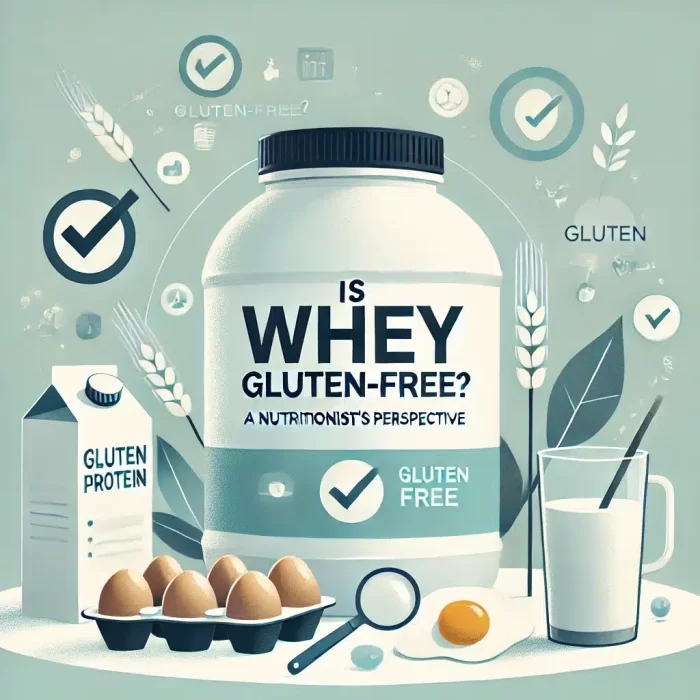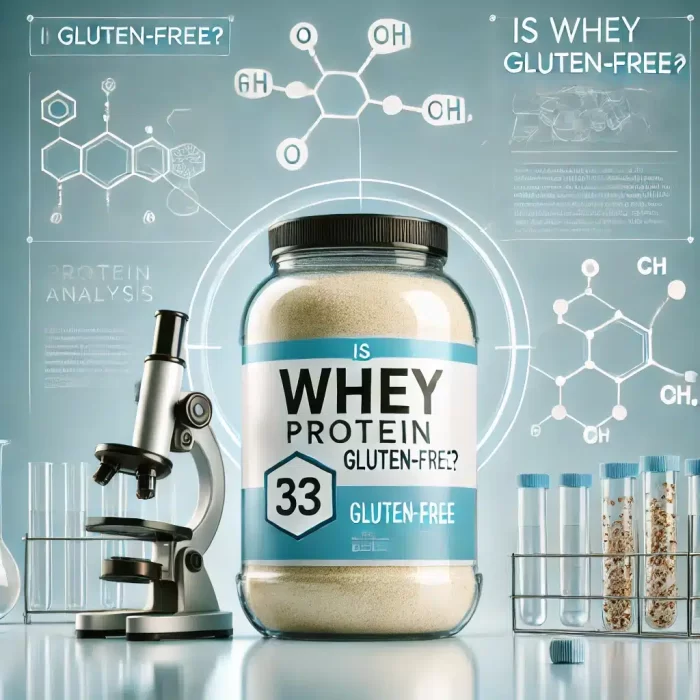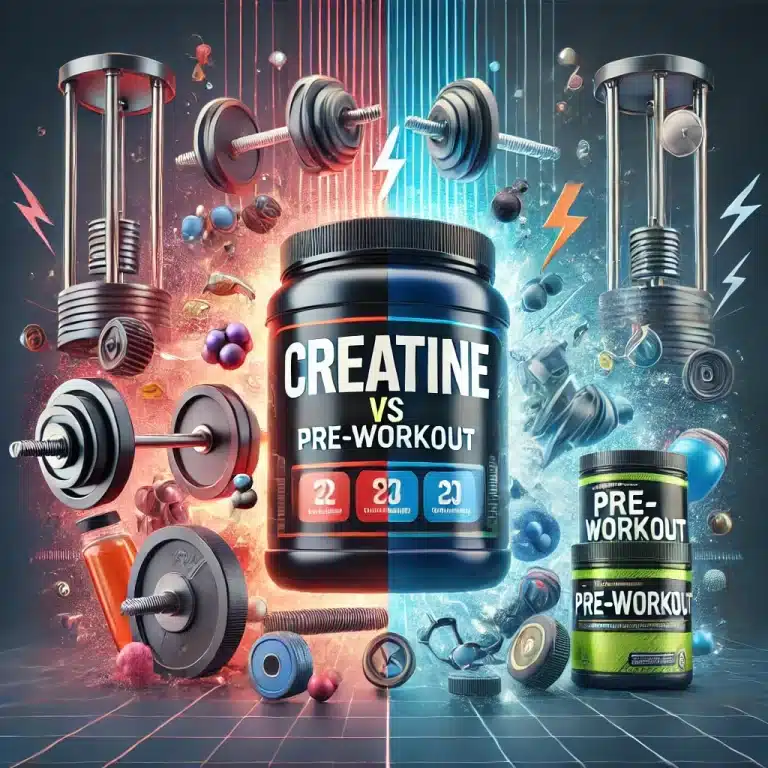Is Whey Gluten-Free? A Nutritionist’s Perspective
So, I was standing in the supplement sections of my neighborhood health store, overwhelmed by rows of protein powders, each one offering speedier recovery, improved performance, and muscle increases. After months of feeling off—bloated, foggy, fatigued for no apparent cause—I had just started a gluten-free diet. Eliminating gluten was not easy (goodbye, pizza evenings), but it was working. I felt lighter, better tuned to my body, clearer.
Now, though, I had a fresh issue: was whey gluten-free?
Right then, it seemed like a straightforward question. Whey derived from milk, not from wheat, really makes sense. But “probably” does not apply when your body responds to even minute levels of gluten. Certainly, I needed to know. And since you’re here, I’m betting you’re asking the same thing: are there hidden chemicals and cross-contamination hazards you should be alert for, or is whey protein gluten-free?
You deserve clear answers regardless of your condition—celiac illness, gluten sensitivity, or just striving to feel your best. From what whey is to how gluten can slip into your protein powder and which brands are safe to trust, this page explains it all. The last thing you need is a gut flare-up from something meant to be healthy whether you’re working hard in the gym or simply trying to fuel your daily needs.
Let’s start here.
What Is Whey?
Made as a byproduct of the cheese-making process, whey is a dairy good taken from milk. The liquid that remains in milk curdled and strained is whey. Packed with vital nutrients, this protein powerhouse is well known for its whole amino acid profile—that is, for having all nine of the amino acids your body requires to run at best. As a dietitian, I have seen whey protein help athletes, fitness junkies, and others trying to up their dietary protein intake.
Whey distinguishes itself primarily in digestion and bioavailability. The body absorbs it readily, hence it’s a perfect choice for post-workout recovery or as a quick protein boost during a hectic day. Its adaptability also helps it to be used in smoothies, drinks, and dishes without sacrificing taste or nutritional worth.
Whey comes in several forms, each with unique characteristics:
Whey Protein Hydrolysate (WPH): Often referred to as “pre-digested,” whey, the hydrolysate breaks down partially under enzymatic action to enable faster absorption. Medical protein supplements and those designed for those with certain dietary requirements often use this type.
Whey Protein Concentrate (WPC): About 70 to 80 percent of this type is protein; the rest is composed of carbs and lipids. It keeps more of the naturally occurring nutrients in whey, including some lactose, which would be important for people with lactose sensitivity.
Whey Protein Isolate (WPI): Isolate is further processed to exclude most of the carbs and lipids, therefore producing a protein level of 90% or more. For those trying to maximize protein while cutting their carb and fat intake, this makes it a great option.
Is Whey Gluten-Free?
The short answer is: Yes, Pure whey protein is gluten-free. But depending on how it’s handled and what’s added to it, the actual product you purchase might not necessarily be gluten-free.
Many of the customers I have seen as a nutritionist thought all whey protein products were suitable for gluten-free diets, only to find some had covert gluten sources. Allow me to dissect it for you such that you can make wise decisions:
- Flavored Whey Products: Many whey protein powders—especially flavored ones like chocolate or cookies and cream—may include gluten. Gluten can be introduced via ingredients such as malt, barley-based flavorings, or even cross-contaminated additives.
- Processing Facilities: Certain companies make whey protein in facilities that also handle gluten-containing components, therefore increasing the possibility of cross-contamination.
- Additives and Fillers: Certain whey products might not always be gluten-free and include binders, thickeners, or stabilizers.
The key to grasp is that whey protein does not naturally contain gluten. Whether in concentrate, isolate, or hydrolysate form, pure whey—is gluten-free by nature. But gluten can sneak in from the components used in flavoring or processing.
I constantly counsel my clients to search for the “Certified Gluten-Free” seal and closely review product labels. The FDA’s threshold for gluten-free labeling is fewer than 20 parts per million (ppm), hence this certification guarantees that the product has less than that. This certification offers a further degree of safety and peace of mind for those with celiac disease or extreme gluten sensitivity.
Keep these ideas in mind too while looking for whey protein:
- Choosing unflavoured whey protein will help you reduce the chance of hidden gluten-containing components.
- Select reliable products that mark on the packaging their gluten-free nature. A big plus is several companies go over and above to test their goods for gluten contamination.
- Any product containing nebulous phrases like “natural flavors” should be avoided unless it is gluten-free. When in doubt, get straight back to the maker for an explanation.
If you find gluten especially sensitive, think about buying whey protein isolate. It is less likely to contain residual carbohydrates or fillers that can introduce gluten as it is more completely processed than whey concentrate. For their gluten-free needs, many of my clients have discovered whey isolate to be a safe and dependable choice.
You may boldly and worry-free include whey protein into your gluten-free diet by spending a little additional time verifying labels and selecting the correct product. As I often advise my clients, the first step in controlling your diet is knowledge.
Who Should Avoid Gluten?

Regarding gluten, none of us have to avoid it exactly. Still, for some people their health and well-being depend on avoiding gluten. Working with many clients who fit into one of these categories as a nutritionist, I know that controlling your diet successfully depends on knowing your particular needs. Let us consider who should avoid gluten and the reasons behind it.
1. People with Celiac Disease
Consuming gluten sets off an autoimmune reaction in celiac disease that destroys the small intestinal lining. This damage compromises the body’s capacity to absorb nutrients, which causes bloating, diarrhoea, tiredness, and potentially long-term problems including anaemia and osteoporosis should the damage be neglected.
Avoiding gluten is not only a preference but also a medical need if you have celiac disease. Harm can result even from minute levels of gluten. For this reason, I constantly counsel individuals with celiac disease to search for gluten-free certifications on items including supplements like whey protein.
2. Individuals with Non-Celiac Gluten Sensitivity (NCGS)
Though less known than celiac disease, non-celiac gluten sensitivity nevertheless causes great misery for individuals afflicted. Among the symptoms could include brain fog, bloating, tiredness, and headaches following gluten intake. Unlike celiac disease, NCGS does not result in intestinal damage; still, eliminating gluten can help symptoms be better and the quality of life is enhanced.
Should you believe you have NCGS, you should monitor your symptoms and see a doctor. Eliminating gluten and tracking your body’s reaction can provide important new information.
3. People with Wheat Allergy
Unlike celiac disease and NCGS, a wheat allergy is not Wheat’s proteins, notably those present in gluten, which cause an allergic response. Mild (hives, nose congestion) to severe (anaphylaxis) symptoms could abound. Avoiding wheat-based products—including some processed whey proteins—is vital for those with a wheat allergy.
4. Those Choosing a Gluten-Free Lifestyle
Some choose a gluten-free diet as a way of life even without a medical problem. Eliminating gluten if done right has no negative effects; still, a balanced diet is crucial to prevent nutrient shortages. If poorly designed, gluten-free diets might occasionally lack iron, B vitamins, and fiber.
For those of my customers who want to become gluten-free, I advise emphasising entire, naturally gluten-free meals including fruits, vegetables, lean meats, and gluten-free grains including quinoa and rice. Regarding whey protein, making sure the product is labeled gluten-free helps streamline their options.
5. Children and Adolescents with Gluten Intolerance
Maintaining a gluten-free diet can be difficult for younger people with gluten sensitivity or intolerance, particularly considering their active lives and social events. Children should be taught by their parents or guardians to identify gluten-free choices and to make sure their diet still provides plenty of nutrients vital for development and growth.
How to Choose a Gluten-Free Whey Protein?
Choosing a whey protein devoid of gluten calls for both diligence and some investigation. As a nutritionist, I constantly advise clients to make decisions with an eye toward openness and quality. These basic guidelines can help you choose the best gluten-free whey protein depending on your requirements:
1. Look for “Certified Gluten-Free” Labels
Search for a certified gluten-free label to be sure a product is gluten-free the easiest way. This certification assures that the good satisfies high criteria and has fewer than 20 parts per million (ppm) of gluten. This accreditation gives comfort to people with extreme gluten sensitivity or celiac disease.
2. Read the Ingredient List Carefully
Sometimes gluten lurks in unexpected locations like flavorings, thickeners, or stabilizers. Ingredients suggesting gluten could be malt, barley extracts, or ambiguous words like “natural flavors.” Always carefully review the ingredient list and stay away from items including dubious or obscure substances.
3. Be Aware of Cross-Contamination Risks
Whey protein may be handled in facilities handling gluten-containing products even if it is itself gluten-free. Search for packaging claims like “produced in a facility that processes wheat.” If you have great sensitivity to gluten, you must pick a product produced in a specialized gluten-free factory.
4. Opt for Pure Whey Protein Isolate
Additional processing on whey protein isolate eliminates carbohydrates, lipids, and other contaminants. This lessens the likelihood of gluten content than whey protein concentrate. If you want a more refined, cleaner product, isolate is usually the best choice for gluten-free requirements.
5. Research Trusted Brands
Transparency and dedication to creating premium gluten-free supplements define some brands. Among my go-to suggestions for clients are:
- Optimum Nutrition Gold Standard Whey: Offers a wide range of flavors and is labeled gluten-free.
- Naked Whey: Unflavored and free from additives, making it a great choice for those avoiding gluten.
- Dymatize ISO100: A whey protein isolate that is rigorously tested and gluten-free certified.
6. Choose Unflavored Options When in Doubt
Because flavored whey protein products include sugars and other tastings, they are more likely to include gluten. Conversely, often a safer bet is unflavoured whey protein. You may quickly personalize it by mixing it with fruits or adding a bit of cocoa powder, even although it might not have the sweetness of flavored choices.
7. Contact the Manufacturer
See the manufacturer personally when in doubt. Many companies offer comprehensive details on their manufacturing techniques and gluten-testing procedures. As a nutritionist, I have seen that following this extra step guarantees the product fits your dietary requirements and helps to avoid unwarranted stress.
8. Check Online Reviews and Recommendations
Online comments from those on a gluten-free diet might offer insightful analysis. Seek comments especially noting the gluten-free aspect of the product and general quality. Communities of people with celiac disease or gluten sensitivity may have consistent advice.
Common Questions About Whey and Gluten:
Can whey protein powders cause gluten reactions?
Though flavored or processed whey products might occasionally include gluten due to additions or cross-contamination, pure whey is gluten-free. Verify the label always.
Is whey protein safe for people with celiac disease?
Yes, as long as the whey protein is labeled gluten-free and produced in a certified gluten-free facility.
Are plant-based protein powders a better option for gluten-free diets?
Though they aren’t intrinsically better in terms of quality or amino acid profile, plant-based protein powders such as hemp, rice, or peas can also be gluten-free. The decision relies on nutritional demands and personal inclination.
Can I find unflavored gluten-free whey protein?
Certainly! Less likely to include gluten or other chemicals, several companies provide unflavoured whey protein.
My Final Take on Whey and Gluten-Free Diets
So, Is whey gluten-free? The response is YES—pure whey is naturally gluten-free. That does not mean, however, that every whey protein supplement is free. A product that should be clean can have gluten introduced by additives, flavorings, fillers, even the production technique. Frustrating, I know. The good news, though, is that once you know what to search for, it becomes simpler.
Stay with whey proteins tagged as certified gluten-free. Search for basic lists of ingredients. And don’t hesitate to contact companies and probe issues; your health is well worth it. Once you have a few go-tos trusted choices, you will be back to concentrating on gains rather than labels.
Gluten-free living does not entail compromising nutrition. It does not imply quitting dairy. It simply involves making wiser decisions and maybe acting as a bit of a label investigator throughout.
The lesson is that One can definitely lead a gluten-free life including whey. You don’t have to pass up post-workout nourishment, muscle recovery, or excellent protein. You only have to be deliberate. See labels. Understanding your body will help you. And don’t settle for “probably gluten-free,” when you really ought to know for sure.
Because your objectives for health count. And your tummy will say thanks.






